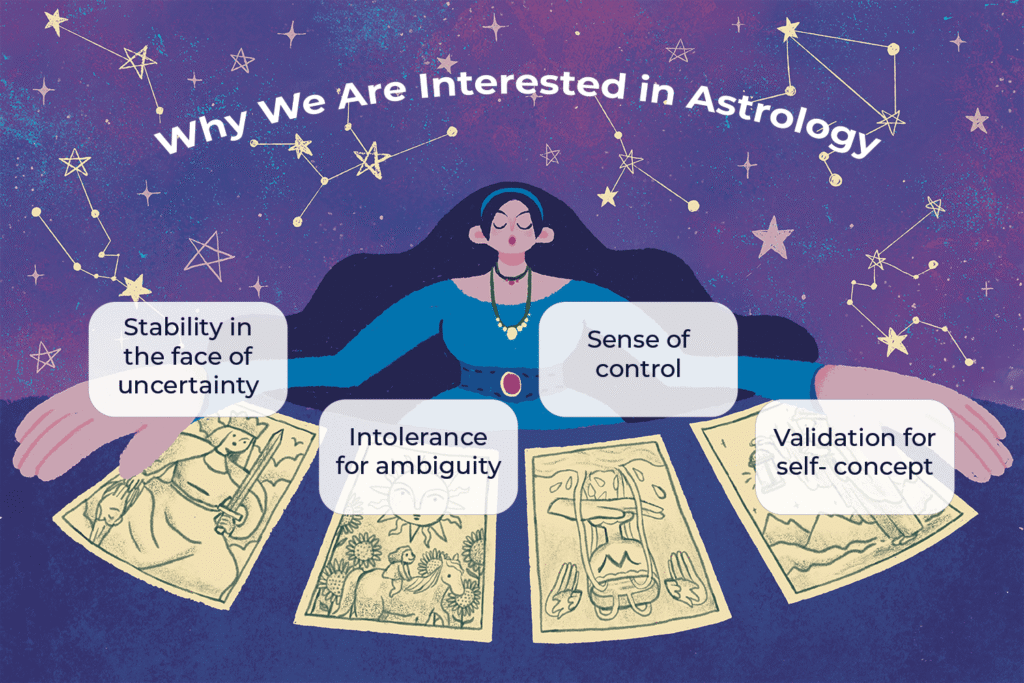Key Takeaways
- Astrology can offer comfort during uncertain times by helping people make sense of complex life events.
- It is popular because it welcomes everyone, especially when traditional institutions fail to offer meaning.
Someone who is into astrology doesn’t just know their sun sign, they also know their moon sign, rising sign, and everything else in their astrological chart. They follow any astrology Instagram account they can find, and their phone notifications are constantly providing updates from their favorite astrology apps.
Astrology is generally considered a pseudoscience versus being a science. There are no scientific and peer-reviewed studies that validate its premises and promises. That said, it can still be a fun and harmless tool to engage with to learn more about one’s self.
But what is it about the messages in the stars that are so appealing? We’ve combed the studies and talked to an astrologist who is also a psychologist to find out. Here’s what we’ve learned.
What Is Astrology?
Astrology is the study of how the positions of the stars and planets are believed to affect human lives. The first organized astrological system appeared in the Old Babylonian period more than 2,000 years ago.
In astrology, people are assigned a specific sign based on their date of birth. These are also referred to as zodiac signs, the zodiac being a belt of the sky where the paths of the sun, moon, and planets are said to move. It is divided into 12 constellations, each representing roughly a month’s time with the “year” beginning at the Northern Hemisphere spring equinox.
The zodiac signs are:
- Aries: March 21–April 19
- Taurus: April 20–May 20
- Gemini: May 21–June 21
- Cancer: June 22–July 22
- Leo: July 23–August 22
- Virgo: August 23–September 22
- Libra: September 23–October 23
- Scorpio: October 24–November 21
- Sagittarius: November 22–December 21
- Capricorn: December 22–January 19
- Aquarius: January 20–February 18
- Pisces: February 19–March 20
Greek tradition solidified the signs that we know today, though there are also thought to be Chinese influences.
Why Do People Believe in Astrology?
A belief in astrology is, in some ways, a coping mechanism. Research suggests that it helps people make sense of things during times when life feels complex. Astrology becomes a tool that can be turned to for comfort.
History shows that people have been more interested in astrology during tumultuous times, with interest rising during the Great Depression in the 1930s as well as in Germany between the two world wars. More recently, astrology boomed in the wake of the coronavirus pandemic.
Why does astrology peak during tough times? “Because so many of the traditional institutions have failed to provide a meaning map for people,” says Jennifer Freed, PhD, a psychologist and astrologist. “Also, astrology, unlike those institutions, has been a place of welcoming for all people.”
It Gives Us a Sense of Control
Another aspect is that astrology may appeal to those who perceive an external locus of control. Someone with an external locus of control will credit outside forces for both the good and the bad, blaming those forces if something goes wrong and crediting luck for success.
Therefore, astrology can be appealing to them because they believe it can give them a hit of good luck that might bolster them to seek other forms of internal reinforcement. It might also be that it is an illusion of control.
It’s a Way to Understand Our Identity
Astrology is seen as a way that one seeks validation for their self-identity, or how they think about themselves. Freed agrees, seeing it as a tool for people to use to “develop their unique gifts and use it for confirmation and encouragement.”
Jennifer Freed, PhD
It’s like having a fabulous rail down an exquisite staircase. You want to walk down the staircase and take every step mindfully, if you have something really solid to hold on to while you take your own steps, this is an excellent journey.
— Jennifer Freed, PhD
Additionally, we are more likely as humans to remember positive feedback that validates our self-conception over negative feedback. For this reason, it’s easy to accept the ambiguous and positive aspects of astrology.
Since it is based on individualized information such as one’s birth date and birthplace, this provides astrology with another degree of credibility in some people’s eyes.
It’s Hard to Tolerate Ambiguity
Astrology may also appeal to those with an intolerance for ambiguity. Similar to how it is used as a coping mechanism, it can provide a sense of stability in the face of uncertainty.
Humans have a profound desire to understand the world. If we can understand what’s going on around us, we can make better decisions for ourselves and our families. This is a survival tactic.
“As human beings throughout eons, we’ve always been in the quest to understand our existence and make meaning of our lives,” says Freed. “Astrology is the oldest system of trying to understand existence and personalities and our personal destinies.”
When we are facing an intellectual overload, believing in something like astrology can feel like we’re getting the answers we crave during a difficult time.
Getting Started With Astrology
Freed views astrology meme accounts or newspaper horoscopes as entertainment. For people who want to begin to dip their toes into learning about astrology, she recommends starting with astrology apps —particularly apps that ask for the user’s time and place of birth, as she says those will provide more accurate information.
Verywell Mind uses only high-quality sources, including peer-reviewed studies, to support the facts within our articles. Read our editorial process to learn more about how we fact-check and keep our content accurate, reliable, and trustworthy.
Thanks for your feedback!
What is your feedback?
Helpful
Report an Error
Other

